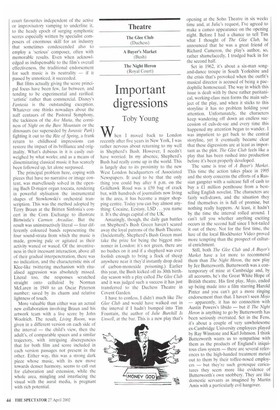Theatre
The Glee Club (Duchess) A Buyer's Market (Bush) The Night Heron (Royal Court)
Important digressions
Toby Young
When I moved back to London recently after five years in New York, I was rather nervous about returning to my well in Shepherd's Bush. However, I needn't have worried. In my absence, Shepherd's Bush had really come up in the world. This is largely due to its proximity to the new West London headquarters of Associated Newspapers. It used to be that the only thing you could buy after 8 p.m. on the Goldhawk Road was a £50 bag of crack but, with hundreds of journalists now living in the area, it has become a major shopping centre. Today you can buy almost anything: Cocaine, Ecstasy, LSD ... you name it. It's the drugs capital of the UK.
Amazingly, though, the daily gun battles on Shepherd's Bush Green haven't scared away the loyal patrons of the Bush Theatre. (Incidentally, Shepherd's Bush Green must take the prize for being the biggest misnomer in London: it's not green, there are no bushes on it and if a shepherd was ever foolish enough to bring a flock of sheep anywhere near it they'd instantly drop dead of carbon-monoxide poisoning.) Earlier this year, the Bush kicked off its 30th birthday season with a play called The Glee Club and it was judged such a success it has just transferred to the Duchess Theatre in Covent Garden.
I have to confess, I didn't much like The Glee Club and would have walked out in the interval if I hadn't bumped into Tim Fountain, the author of Julie Burchill Is Unwell, at the bar. This is a new play that's opening at the Soho Theatre in six weeks time and, at Julie's request, I've agreed to make a cameo appearance on the opening night. Before I had a chance to tell Tim what I thought of The Glee Club, he announced that he was a great friend of Richard Cameron, the play's author, so, rather shamefacedly, I trudged back in for the second half.
Set in 1962, it's about a six-man songand-dance troupe in South Yorkshire and the crisis that's provoked when the outfit's musical director is accused of being a paedophilic homosexual. The way in which this issue is dealt with by these rather puritanical, working-class men forms the main subject of the play, and when it sticks to this storyline it has no problem holding your attention. Unfortunately, the characters keep wandering off down an endless succession of culs-de-sac and every time this happened my attention began to wander. I was impatient to get back to the central storyline, yet it eventually became clear that these digressions are at least as important as the plot. The Glee Club feels like a play that has been rushed into production before it's been properly developed.
The same is true of A Buyer's Market. This time the action takes place in 1995 and the story concerns the efforts of a Russian gangster with a suitcase full of cash to buy a £.1 million penthouse from a bestselling English novelist. The characters are fairly well-drawn, and the situation they find themselves in is full of promise, but nothing really happens. At least, it hadn't by the time the interval rolled around. I can't tell you whether anything exciting occurs in the second half since I hot-tailed it out of there. Not for the first time, the lure of the local Blockbuster Video proved more tempting than the prospect of cultural enrichment.
Still, both The Glee Club and A Buyer's Market have a lot more to recommend them than The Night Heron, the new play by Jez Butterworth. Butterworth was a contemporary of mine at Cambridge and, by all accounts, he's the Great White Hope of British theatre. His first play, Mojo, ended up being made into a film starring Harold Pinter and you can't get a more ringing endorsement than that. I haven't seen Mojo — apparently, it has no connection with Austin Powers's libido — but if The Night Heron is anything to go by Butterworth has been seriously overrated. Set in the Fens, it's about a couple of very unwholesome ex-Cambridge University employees played by Ray Winstone and Karl Johnson. I think Butterworth wants us to sympathise with them as the products of England's iniquitous class system — there are several references to the high-handed treatment meted out to them by their toffee-nosed employers — but they're such grotesque caricatures they seem more like evidence of Butterworth's own snobbery. They are like domestic servants as imagined by Martin Amis with a particularly evil hangover.


































































 Previous page
Previous page